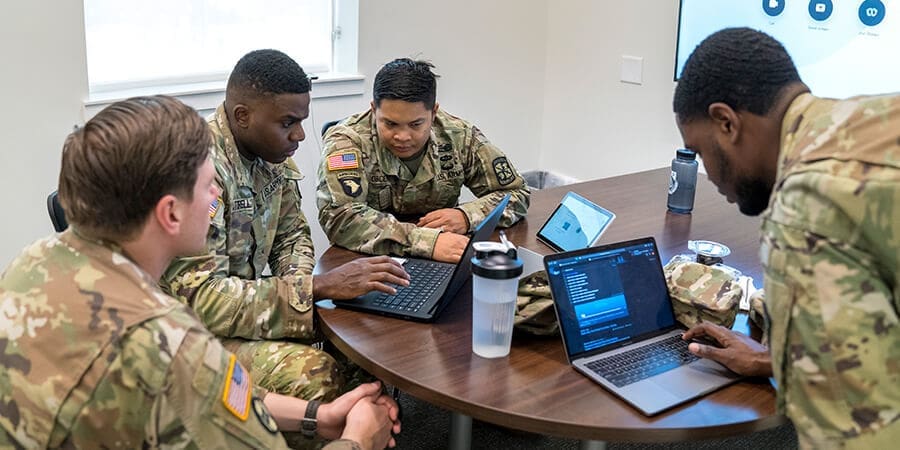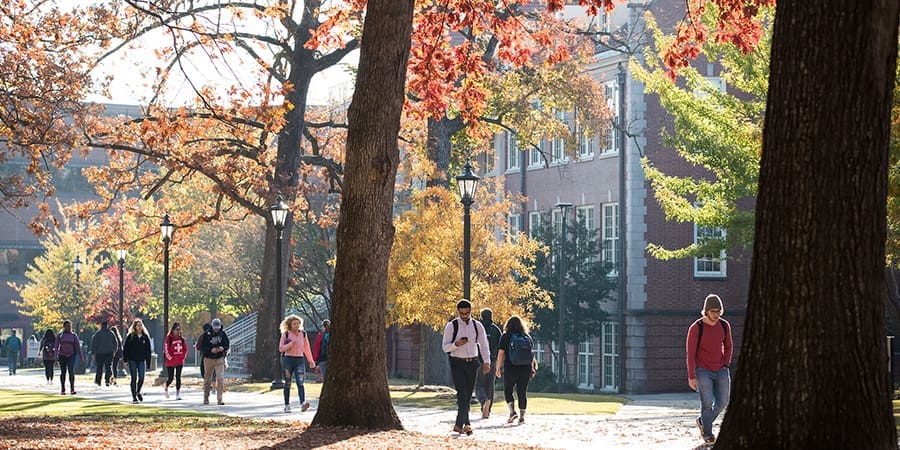Across the UNC System, nearly one-third of all students enrolled are transfer students. The UNC System is proud to attract and serve a diverse range of transfer students coming from the military, community colleges, or other universities to complete their educational journeys.
One of the UNC System’s top priorities is increasing access to higher education, so that all qualified and prepared North Carolinians can find a way to pursue, complete, or continue their post-secondary education. Transfer access is central to the UNC System’s mission, so our universities have developed streamlined pathways, transfer planning resources, and partnerships to promote more successful transfer experiences.
Get to Know our Transfer Students
Across the UNC System, all students who have completed college coursework after high school graduation are considered transfer students. These students bring with them experiences and diverse backgrounds that positively impact campuses and uniquely prepare students for success after graduation. Learn more about North Carolina’s transfer students:

Military-Affiliated Students
The UNC System understands that students who have served in the United States Military and have either an ‘active duty’ or ‘veteran’ status have unique needs. In addition to receiving credit for education and work experience completed during service, military-affiliated students are eligible for dedicated support, application fee waivers, unique scholarships, priority registration, and more. Visit our Military Affairs page to learn how the UNC System is supporting military student success.

Adult Learners
Adult learners make up an increasingly sizeable percentage of UNC System students. Our universities have developed more flexible degree pathways, increased online course options, created spaces on campus to support adult learners, and developed Systemwide policies to maximize credit for prior learning. The UNC System understands that adult learners often bring college credit with them, and we are ready to support them as they gather transcripts, complete applications, and progress towards earning a degree.

Current or Former UNC System Students
Students who are currently enrolled at or have previously attended a UNC System institution can transfer to other universities within the System. While each university’s transfer admissions criteria and credit equivalencies will vary, it is likely that credits will transfer between institutions. We recommend that you explore degree requirements at specific universities, as major requirements and general education requirements may differ between institutions. You can also look at the Common Numbering System, which guarantees credit for certain courses between UNC System institutions, to help streamline the transfer process.

Out-of-State Students
North Carolina has become an increasingly popular destination because of its education and workforce opportunities. Students who are interested in transferring to a UNC System institution with previous credit accrued outside of North Carolina can feel confident that many credits transfer and degree completion opportunities are vast across our 16 institutions.

NC Community College Students
Students transitioning into the UNC System from the North Carolina Community College System may benefit from the Comprehensive Articulation Agreement, a compact governing the transfer of credits between the state’s community colleges and UNC System universities, as well as other Uniformed Articulation Agreements, and bilateral/multilateral agreements between individual community colleges and universities. Visit the NC Community College Transfer Student page for more information.
How to Transfer to a UNC System university
For the most seamless transfer process, students transferring into or within the UNC System should proactively explore university programs offered, admissions requirements, and transfer credit equivalency resources available through each institution. While the transfer admissions process varies slightly by university, System efforts have helped streamline transfer processes and universities have developed transfer tools to support our state’s diverse student population. Below are common steps students take to transfer to a UNC System university:
- Compare and contrast the 16 universities within the UNC System, focusing your attention on finding the institutions that offer the major you want to pursue.
- Using the table below, contact transfer professionals at universities for support. We strongly encourage you to speak with a transfer counselor and/or attend a transfer event at your chosen institution early in your transfer planning.
- After choosing a university, review its admission requirements and its institutional transfer resources – transfer credit equivalency tools, degree plans, specific major considerations, etc.
- Complete the transfer admissions application and submit appropriate documentation (oftentimes this includes official college transcripts from all previously attended institutions).
- Fill out a free application for Federal Student Aid (FAFSA) and connect with the financial aid office at the institution of your choice.
- Receive admissions decisions and review your official transfer credit evaluation provided by the university.
- Complete enrollment steps with your university (orientation, advising and course registration).
Understanding Transfer Credit
How a student’s previously earned credit is accepted and applied by a receiving institution is critical to a positive transfer experience. Since each institution determines their own transfer equivalencies, it is possible that transfer credit is evaluated and applied differently depending on the university. To help students understand how credit is accepted, each UNC System Institution provides information about transfer course equivalencies with published transfer credit equivalency databases. Since official transfer credit evaluations are usually provided after completing the transfer admissions process, these resources allow students to search previously attended institutions and see how credits have been received by the UNC institution of interest. Please note that the information is updated continuously and does not replace formal transfer credit evaluation processes.
- Appalachian State University Transfer Equivalency Search
- East Carolina University Transfer Course Equivalency Search
- Elizabeth City State University Transfer Course Equivalency
- Fayetteville State University Transfer Equivalency Guide
- North Carolina A&T State University Transfer Credit Chart for General Education
- North Carolina Central University Course Equivalency
- North Carolina State University Transfer Course Credit List
- UNC Asheville Transfer Equivalencies
- UNC-Chapel Hill Transfer Equivalencies
- UNC Charlotte Transfer Credit Advisor Tool
- UNC Greensboro Transfer Equivalency Search
- UNC Pembroke Transfer Equivalency Table
- UNC Wilmington Transfer Articulation Tables
- Western Carolina University Transfer Credit Chart
- Winston-Salem State University Transfer Equivalency Table
Not only are the transfer credit equivalency databases great for understanding how your credit may transfer, but they are also a tool to help you better plan for your transfer. Transfer students will find it advantageous to research which courses will transfer from their current institution to their next institution and identify courses at their current institution that will count toward degree requirements at a future university. If connecting with a transfer advisor at the university to which you plan to transfer, consider asking the following questions regarding the transfer of credits:
- Which courses at your current institution will satisfy the general education requirements at the university to which you plan to transfer?
- Which classes will satisfy the prerequisites for the upper-level coursework you will need to complete?
- Will any courses at the first institution count toward the degree requirements at the second institution?
University Transfer Contacts
All UNC System institutions have transfer-specific staff to support students. Use the table below to find and connect with transfer staff at the institution of your choice. Connecting with a transfer counselor early in the transfer process is strongly encouraged.
| Campus | General Transfer Contact |
| Appalachian State University | transferadmissions@appstate.edu |
| East Carolina University | transfer@ecu.edu |
| Elizabeth City State University | transfer@ecsu.edu |
| Fayetteville State University | admissions@uncfsu.edu |
| North Carolina A&T State University | uadmit@ncat.edu |
| North Carolina Central University | transfer@nccu.edu |
| NC State University | undergrad-admissions@ncsu.edu |
| UNC Asheville | transfer@unca.edu |
| UNC-Chapel Hill | Website |
| UNC Charlotte | admissions@charlotte.edu |
| UNC Greensboro | Website |
| UNC Pembroke | transfer@uncp.edu |
| UNC Wilmington | Website |
| Western Carolina University | admiss@wcu.edu |
| Winston-Salem State University | hindsm@wssu.edu |